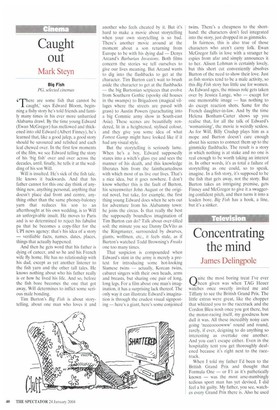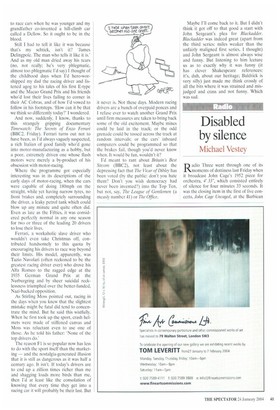Concentrating the mind
James Delingpole
Ctiuite the most boring treat I've ever ..J been given was when TAG Heuer watches once sweetly invited me and Tiffany to see the British Grand Prix. The little extras were great, like the chopper that whizzed you to the racetrack and the Cordon Bleu nosh once you got there, but the motor-racing itself, my goodness how dull it was. All these incredibly noisy cars going `neee0000www' round and round, rarely, if ever, deigning to do anything so interesting as overtake one another. And you can't escape either. Even in the hospitality tent you get thoroughly deafened because it's right next to the racetrack.
When I told my father I'd been to the British Grand Prix and thought that Formula One — or Fl as it's pathetically known — was the most arse-numbingly tedious sport man has yet devised, I did feel a bit guilty. My father, you see, watches every Grand Prix there is. Also he used to race cars when he was younger and my grandfather co-invented a hill-climb car called a Dellow. So it ought to be in the blood, Still I had to tell it like it was because that's my schtick, isn't it? 'James Delingpole. The man who tells it like it is.' And as my old man dried away his tears (no, not really; he's very phlegmatic, almost too phlegmatic I'd say) I thought of the childhood days when I'd hero-worshipped my dad the racing driver and listened agog to his tales of his first E-type and the Macao Grand Prix and his friends who'd lost their lives failing to corner in their AC Cobras, and of how I'd vowed to follow in his footsteps. 'How can it be that we think so differently today?' I wondered.
And now, suddenly. I know, thanks to this strangely gripping documentary Timewatch: The Secrets of Enzo Ferrari (BBC2, Friday). Ferrari turns out not to have been, as I'd always vaguely suspected, a rich Italian of good family who'd gone into motor-manufacturing as a hobby, but a poor, extremely driven one whose flash motors were merely a by-product of his obsession with motor-racing.
Where the programme got especially interesting was in its descriptions of the early days of motor-racing, when the cars were capable of doing 180mph on the straight, while yet having narrow tyres, no front brakes and, completely surrounding the driver, a leaky petrol tank which could blow up any minute and quite often did. Even as late as the Fifties, it was considered perfectly normal in any one season for two or three of the leading 20 drivers to lose their lives.
Ferrari, a workaholic slave driver who wouldn't even take Christmas off, contributed handsomely to this quota by encouraging his drivers to race way beyond their limits. His model, apparently, was Tazio Nuvolari (often reckoned to be the greatest racing driver ever) who drove his Alfa Romeo to the ragged edge at the 1935 German Grand Prix at the Nurburgring and by sheer suicidal recklessness triumphed over the better-funded, Nazi-backed opposition.
As Stirling Moss pointed out, racing in the days when you knew that the slightest mistake might be fatal did tend to concentrate the mind. But he said this wistfully. When he first took up the sport, crash helmets were made of stiffened canvas and Moss was reluctant even to use one of those. As he told his father: 'None of the top drivers do.'
The reason Fl is so popular now has less to do with the sport itself than the marketing — and the nostalgia-generated illusion that it is still as dangerous as it was half a century ago. It isn't. If today's drivers are to end up a zillion times richer than me and shagging loads more birds than me, then I'd at least like the consolation of knowing that every time they get into a racing car it will probably be their last. But it never is. Not these days. Modern racing drivers are a bunch of overpaid ponces and I refuse ever to watch another Grand Prix until firm measures are taken to bring back some of the old excitement. Maybe mines could be laid in the track; or the odd grenade could be tossed across the track at random intervals; or the cars' inboard computers could be programmed so that the brakes fail, though you'd never know when. It would be fun, wouldn't it?
I'd meant to rant about Britain's Best Sitcom (BBC2), not least about the depressing fact that The Vicar of Dibley has been voted (by the public: don't you hate them? Don't you wish democracy had never been invented?) into the Top Ten, but not, say, The League of Gentlemen (a meas!y number 41) or The Office. Maybe I'll come back to it. But I didn't think it got off to that good a start with John Sergeant's plea for Blackadder. Blackadder was indeed great (apart from the third series: miles weaker than the unfairly maligned first series, I thought) and John Sergeant is almost always wise and funny. But listening to him lecture us as to exactly why it was funny (it has clever Shakespeare references; it's, duh, about our heritage; Baldrick is very silly) just made me think crossly of all the bits where it was strained and misjudged and crass and not funny. Which was sad.



























































 Previous page
Previous page